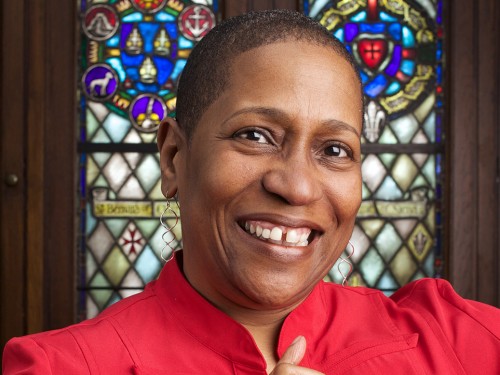Is Your Love Political?

Rev. Dr. Pamela Lightsey delivered a rousing sermon at Spring Intensives Opening Worship, March 19, 2018. Below is an excerpt.
Text: The Words of Audre Lorde
“I see protest as a genuine means of encouraging someone to feel the inconsistencies, the horror, of the lives we are living. Social protest is to say that we do not have to live this way. If we feel deeply, as we encourage ourselves and others to feel deeply, we will, within that feeling, once we recognize we can feel deeply, we can love deeply, we can feel joy, then we will demand that all parts of our lives produce that kind of joy. And when they do not, we will ask, "Why don't they?" And it is the asking that will lead us inevitably toward change.”
Is Your Love Political?
One of my favorite essays is one written in 1986 by the late Audre Lorde entitled, Is Your Hair Still Political? In this
With her friend and the young white pilot standing with her wondering what and why, the
This morning I’m interested in the ways an act of love is perceived as a threat to the political order because it is so pure, because it is so aimed at justice, seems so nonconforming and so threatening to the consolidation of power and control that it comes to the attention of the gatekeepers. Is Your Love Political?
I admit to you, my thoughts on the politics of love are shaded by, are influenced by, have been developed by a lifetime of being a product of the African American culture and being a practitioner of my culture’s struggle as Malcolm X said in 1965, “by any means necessary.”
I admit to you, Fannie Lou Hamer, “Nobody’s free until everybody’s free.”
I admit to you, Simon de Beauvoir, whose hope I carry to this day, “I wish,” she said, “that every human life might be pure transparent freedom.”
And, my friends, I admit to you, my thoughts on the politics of love, this ethic of love and justice for all humanity and for the Earth itself has gripped my heart on every occasion that I’ve joined a protest for justice. Do you understand the sheer magnitude of this kind of love? Are you willing to walk in the way, the messy way at times, the dangerous way at times, the ambiguous way at times, the bitter way at times…
Lorde was correct: “…we do not have to live this way.” We do not have to live in a world where
Perhaps, just perhaps, you are here because your love is indeed political. Your love is the kind of love that protects the children – against assault weapons and legislative weapons that threaten to break up families. It’s the kind of love that stands with those who have the courage to say #MeToo. Or maybe, just maybe, you are here because you are not quite there, but you’ve been taking tiny steps and being here helps you to get what you need to stop wobbling as much, to adjust your love-equilibrium and to walk together and not be weary.

Rev. Pamela Lightsey, Ph.D.
The Rev. Dr. Pamela Lightsey joined MLTS in January 2018. Prior to her appointment, Dr. Lightsey served as Associate Dean of Community Life and Lifelong Learning, Clinical Assistant Professor of Contextual Theology and Practice at the Boston University School of Theology.
Continue Reading
